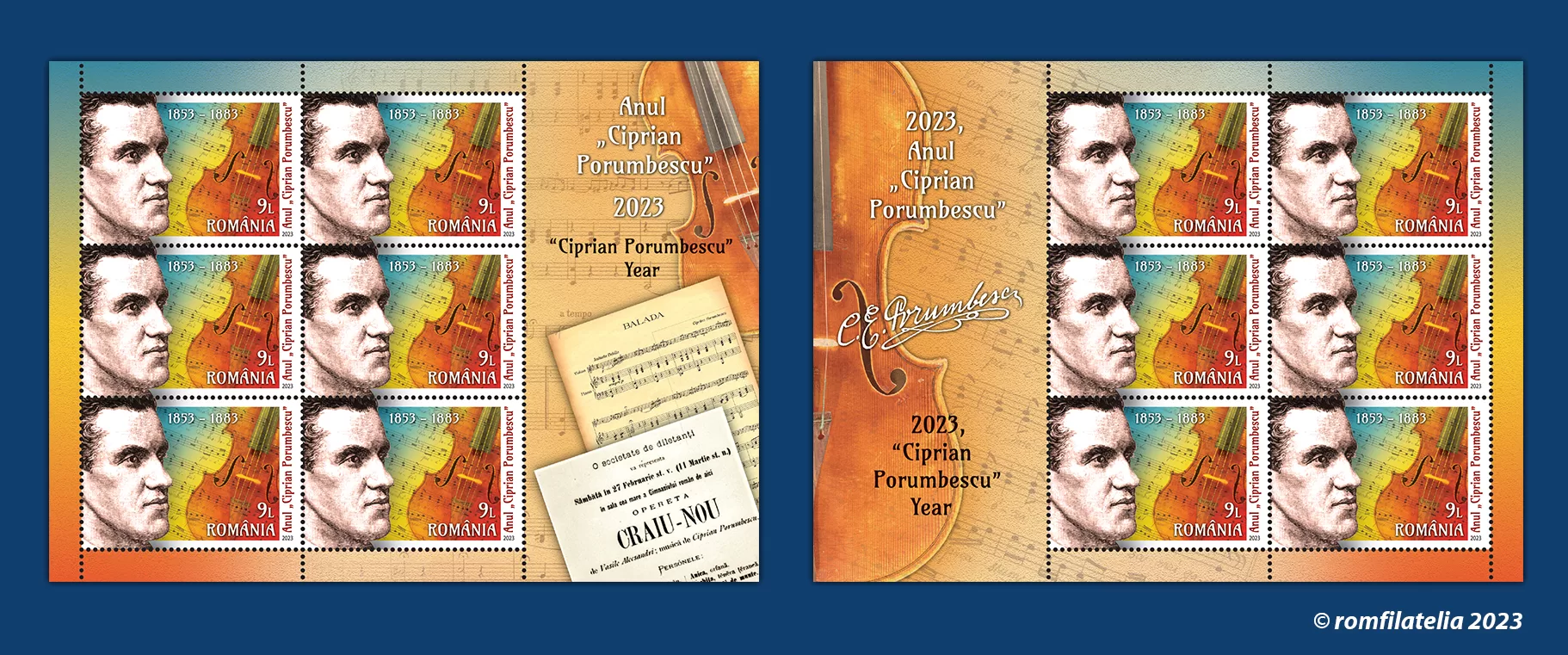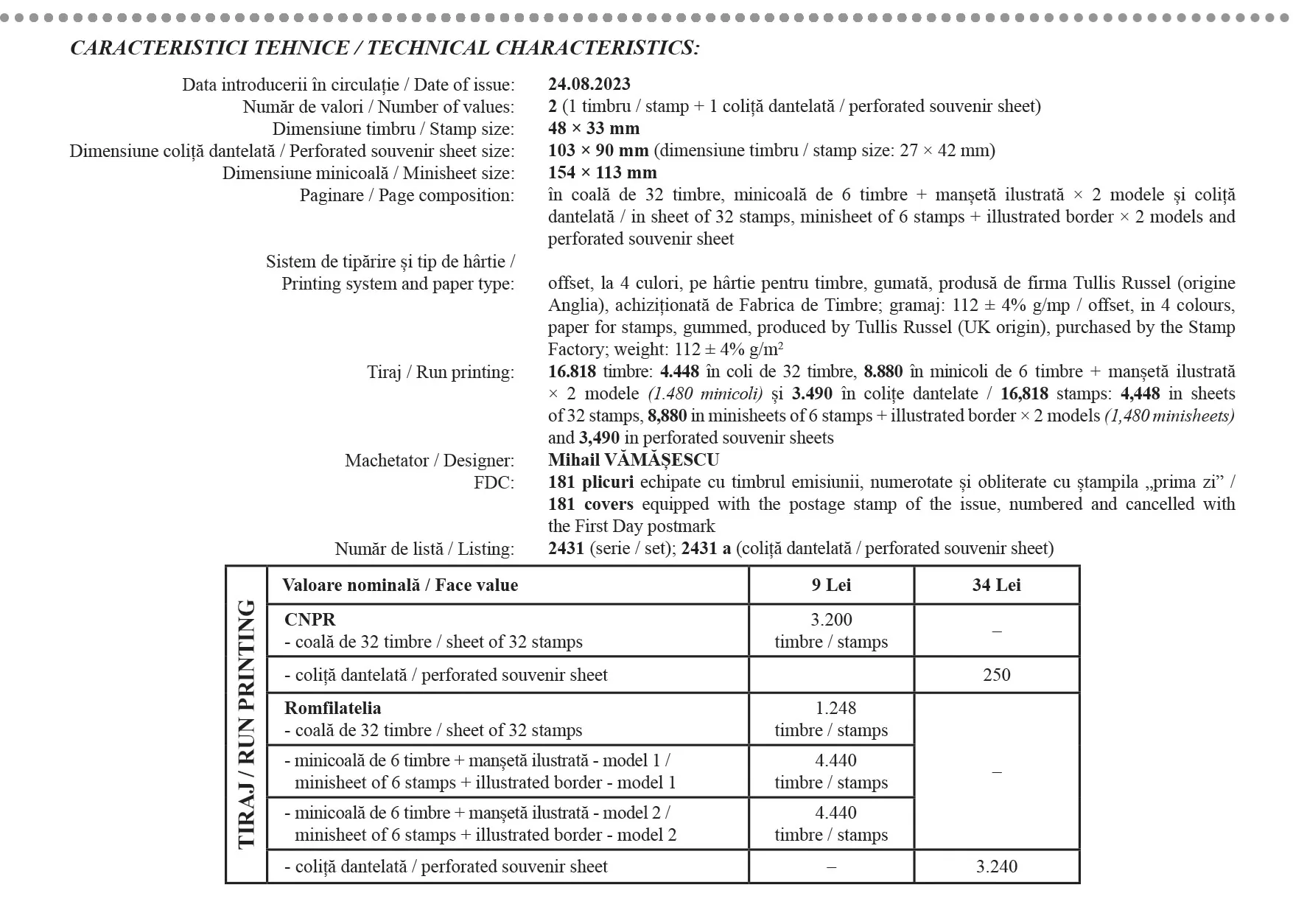 This year, we celebrate 170 years since the birth of Ciprian Porumbescu and 140 years since his death. As a sign of special respect for the great composer and performer, the year 2023 has been established as “Ciprian Porumbescu” Year.
This year, we celebrate 170 years since the birth of Ciprian Porumbescu and 140 years since his death. As a sign of special respect for the great composer and performer, the year 2023 has been established as “Ciprian Porumbescu” Year.
An issue with the same title, consisting of 1 stamp with the face value of Lei 9, a perforated souvenir sheet having the stamp with the face value of Lei 34 and a First Day Cover, will be introduced into circulation by Romfilatelia on Thursday, August 24, this year.
He was born on October 14th, 1853, in Șipotele Sucevei. He began studying music in Suceava and Chernivtsi, continuing over the years to perfect his mastery of the bow in Vienna.
At the celebration of 400 years since the building of Putna Monastery, in 1871, he was among the participants in the festivities, together with Mihai Eminescu, Ioan Slavici, A. D. Xenopol, Nicolae Teclu and others, praised by the entire audience for his violin playing. This is the moment when Ciprian Porumbescu exclaimed: “Now I can die because I have sung to the whole of Dacia”.
Four years after this event, at the University of Chernivtsi, where the great composer was studying Orthodox theology, the Arboroasa Academic Society was founded, modelled on the Romanian students’ society in Vienna România Jună.
Considered a militant patriotic association, “Arboroasa” came under the close supervision of the Austrian rule. Ciprian Porumbescu is arrested with four other students and sentenced to three months in prison. Due to the harsh conditions of his imprisonment, the composer became seriously ill with tuberculosis.
He returned to the country, where in March 1882, he premiered his operetta “Crai Nou” (“New Moon”) in Brașov, the first Romanian operetta, composed by Ciprian Porumbescu after the text of the poet Vasile Alecsandri’s poem. The operetta was a great success.
He leaves the country and settles in Italy for a while to take care of his health. His longing for the country and his unfulfilled love for Berta Gorgon, the daughter of the pastor of Ilișești (whom his father had forbidden to have anything to do with Ciprian), are a constant source of pain. He wrote to his parents: “I am homesick. I will find the right way to it. I’ll cling to a stork that comes back in the spring and I’ll stop right in the house’s yard”.
Seriously ill with tuberculosis, on March 10th, 1883 he returned to his parents’ home, where he died, under the eyes of his father and his dear sister, Mărioara, on June 6th, at only 29 years old.
Ciprian Porumbescu was one of the most famous composers of his time. Among his most famous works are “Ballade for violin and orchestra” op. 29, the operetta “Crai Nou” (“New Moon”), the patriotic song “Pe-al nostru steag e scris Unire” (“On our flag Union is written”, the current anthem of Albania), “Trei culori” (“Three colours”, former anthem of Romania). Among his more than two hundred compositions are Serenadă (Serenade), La malurile Prutului (On the banks of the Prut), Altarul Mănăstirii Putna (Altar of Putna Monastery), Inimă de român (Heart of a Romanian), Odă ostașilor români (Ode to the Romanian soldiers).
The last wish, written in the last stanza of the “Song of the Tricolour”, was fulfilled, on the cross of his grave there are the colours of the Romanian flag and the lines: “And when, brothers, I will go / From you, and I will die / On my grave then put / Our proud tricolour”.
As a gesture of great appreciation, on July 30, this year, on the stage of the Musikverein in Vienna, the famous “Golden Hall” hosted the presence of the Bucharest National Opera with the operetta “New Moon”, composed by the great Romanian musician.
Romfilatelia thanks the Bukovina’s National Museum and the National Archives of Romania – Suceava, for their collaboration within this issue of postage stamps.









